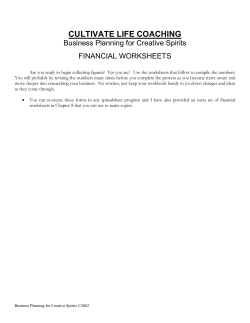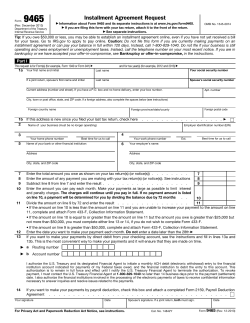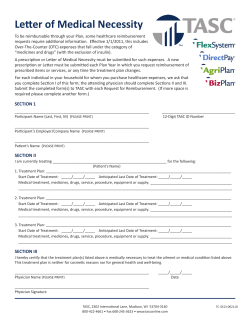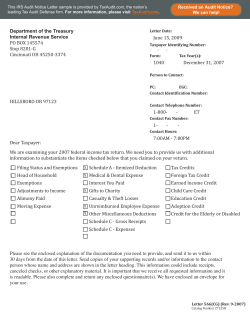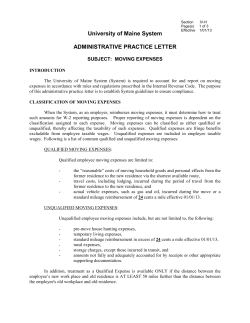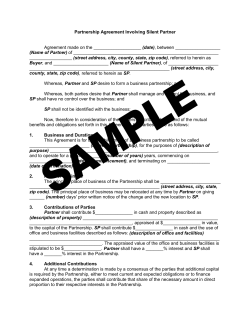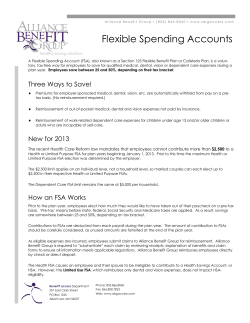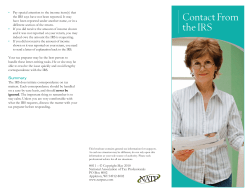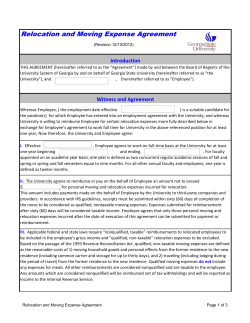
Collection Information Statement
Collection Information Statement Your Social Security Number or Individual Taxpayer Identification Number Name(s) and Address Your Spouse’s Social Security Number or Individual Taxpayer Identification Number If address provided above is different than last return filed, please check here County of Residence Your Telephone Numbers Home: Work: Cell: Spouse’s Telephone Numbers Home: Work: Cell: Enter the number of people in the household who can be claimed on this year’s tax return including you and your spouse. Under 65 65 and Over If you or your spouse are self employed or have self employment income, provide the following information: Name of Business Type of Business Business EIN Number of Employees (not counting owner) A. ACCOUNTS / LINES OF CREDIT Include checking, online, mobile (e.g., PayPal) and savings accounts, Certificates of Deposit, Trusts, Individual Retirement Accounts (IRAs), Keogh Plans, Simplified Employee Pensions, 401(k) Plans, Profit Sharing Plans, Mutual Funds, Stocks, Bonds and other investments. If applicable, include business accounts. (Use additional sheets if necessary.) Name and Address of Institution Account Number Type of Account Current Balance/Value Check if Business Account B. REAL ESTATE Include home, vacation property, timeshares, vacant land and other real estate. (Use additional sheets if necessary.) Description/Location/County Primary Residence Primary Residence Monthly Payment(s) Financing Current Value Year Purchased Purchase Price Year Refinanced Refinance Amount Year Purchased Purchase Price Year Refinanced Refinance Amount Balance Owed Equity Other Other C. OTHER ASSETS Include cars, boats, recreational vehicles, whole life policies, etc. Include make, model and year of vehicles and name of Life Insurance company in Description. If applicable, include business assets such as tools, equipment, inventory, etc. (Use additional sheets if necessary.) Description Monthly Payment Year Purchased Final Payment (mo/yr) Current Value Balance Owed Equity / / / / / / / NOTES (For IRS Use Only) TURN PAGE TO CONTINUE Form 433-F (Rev. 1-2013) Catalog 62053J Department of the Treasury Internal Revenue Service publish.no.irs.gov Page 2 of 4 D. CREDIT CARDS (Visa, MasterCard, American Express, Department Stores, etc.) Type Credit Limit Balance Owed Minimum Monthly Payment E. BUSINESS INFORMATION Complete E1 for Accounts Receivable owed to you or your business. (Use additional sheets if necessary.) Complete E2 if you or your business accepts credit card payments. E1. Accounts Receivable owed to you or your business Name Address Amount Owed List total amount owed from additional sheets Total amount of accounts receivable available to pay to IRS now E2. Name of individual or business on account Credit Card Issuing Bank Name and Address (Visa, Master Card, etc.) Merchant Account Number F. EMPLOYMENT INFORMATION If you have more than one employer, include the information on another sheet of paper. (If attaching a copy of current pay stub, you do not need to complete this section.) Your current Employer (name and address) How often are you paid? (Check one) Weekly Biweekly Semi-monthly Spouse’s current Employer (name and address) How often are you paid? (Check one) Weekly Biweekly Semi-monthly Monthly Gross per pay period Taxes per pay period (Fed) How long at current employer (State) Gross per pay period Taxes per pay period (Fed) How long at current employer (Local) (State) Monthly (Local) G. NON-WAGE HOUSEHOLD INCOME List monthly amounts. For Self-Employment and Rental Income, list the monthly amount received after expenses or taxes and attach a copy of your current year profit and loss statement. Alimony Income Child Support Income Net Self Employment Income Net Rental Income Unemployment Income Pension Income Interest/Dividends Income Social Security Income Other: H. MONTHLY NECESSARY LIVING EXPENSES List monthly amounts. (For expenses paid other than monthly, see instructions.) 1. Food / Personal Care See instructions. If you do not spend more than the standard allowable amount for your family size, fill in the Total amount only. Food Housekeeping Supplies Clothing and Clothing Services Personal Care Products & Services Miscellaneous 3. Housing & Utilities Rent Electric, Oil/Gas, Water/Trash Telephone/Cell/Cable/Internet Real Estate Taxes and Insurance (if not included in B above) Maintenance and Repairs Total Total 2. Transportation Gas/Insurance/Licenses/Parking/ Maintenance etc. Public Transportation 5. Other 4. Medical Health Insurance Out of Pocket Health Care Expenses Child / Dependent Care Estimated Tax Payments Term Life Insurance Retirement (Employer Required) Retirement (Voluntary) Union Dues Delinquent State & Local Taxes (minimum payment) Student Loans (minimum payment) Court Ordered Child Support Court Ordered Alimony Other Court Ordered Payments Other (specify) Other (specify) Other (specify) Under penalty of perjury, I declare to the best of my knowledge and belief this statement of assets, liabilities and other information is true, correct and complete. Your Signature Spouse’s Signature Date Form 433-F (Rev. 1-2013) Catalog 62053J Department of the Treasury Internal Revenue Service publish.no.irs.gov Page 3 of 4 Instructions Who should use Form 433-F? Section D – Credit Cards Form 433-F is used to obtain current financial information necessary for determining how a wage earner or selfemployed individual can satisfy an outstanding tax liability. List all credit cards and lines of credit, even if there is no balance owed. Note: You may be able to establish an Online Payment Agreement on the IRS web site. To apply online, go to http://www.irs.gov, click on “I need to pay my taxes,” and select “Installment Agreement” under the heading “What if I can't pay now?” If you are requesting an Installment Agreement, you should submit Form 9465, Installment Agreement Request, along with Form 433-F. (A large down payment may streamline the installment agreement process, pay your balance faster and reduce the amount of penalties and interest charged.) Section E – Business Information Complete this section if you or your spouse are selfemployed, or have self-employment income. This includes self-employment income from online sales. E1: List all Accounts Receivable owed to you or your business. Include federal, state and local grants and contracts. E2: Complete if you or your business accepts credit card payments (e.g., Visa, MasterCard, etc.). After we review your completed form, we may contact you for additional information. For example, we may ask you to send supporting documentation of your current income or substantiation of your stated expenditures. Section F – Employment Information If any section on this form is too small for the information you need to supply, please use a separate sheet. Section G – Non-Wage Household Income Section A – Accounts / Lines of Credit List all accounts, even if they currently have no balance. However, do not enter bank loans in this section. Include business accounts, if applicable. If you are entering information for a stock or bond, etc. and a question does not apply, enter N/A. Section B – Real Estate List all real estate you own or are purchasing including your home. Include insurance and taxes if they are included in your monthly payment. The county/description is needed if different than the address and county you listed above. To determine equity, subtract the amount owed for each piece of real estate from its current market value. Section C – Other Assets List all cars, boats and recreational vehicles with their make, model and year. If a vehicle is leased, write “lease” in the “year purchased” column. List whole life insurance policies with the name of the insurance company. List other assets with a description such as “paintings”, “coin collection”, or “antiques”. If applicable, include business assets, such as tools, equipment, inventory, and intangible assets such as domain names, patents, copyrights, etc. To determine equity, subtract the amount owed from its current market value. If you are entering information for an asset and a question does not apply, enter N/A. If attaching a copy of current pay stub, you do not need to complete this section. List all non-wage income received monthly. Net Self-Employment Income is the amount you or your spouse earns after you pay ordinary and necessary monthly business expenses. This figure should relate to the yearly net profit from Schedule C on your Form 1040 or your current year profit and loss statement. Please attach a copy of Schedule C or your current year profit and loss statement. If net income is a loss, enter “0”. Net Rental Income is the amount you earn after you pay ordinary and necessary monthly rental expenses. This figure should relate to the amount reported on Schedule E of your Form 1040 (do not include depreciation expenses). If net rental income is a loss, enter “0”. Other Income includes distributions from partnerships and subchapter S corporations reported on Schedule K-1, and from limited liability companies reported on Form 1040, Schedule C, D or E. It also includes agricultural subsidies, unemployment compensation, gambling income, oil credits, rent subsidies, Social Security and Interest/Dividends. Enter total distributions from IRAs if not included under Pension Income. Form 433-F (Rev. 1-2013) Catalog 62053J Department of the Treasury Internal Revenue Service publish.no.irs.gov Page 4 of 4 Instructions Section H – Monthly Necessary Living Expenses Medical – You are allowed expenses for health insurance and out-of-pocket health care costs. Enter monthly amounts for expenses. For any expenses not paid monthly, convert as follows: Health insurance – Enter the monthly amount you pay for yourself or your family. If a bill is paid … Calculate the monthly amount by … Quarterly Dividing by 3 Weekly Multiplying by 4.3 Biweekly (every two weeks) Multiplying by 2.17 Semimonthly (twice each month) Multiplying by 2 For expenses claimed in boxes 1 and 4, you should provide the IRS allowable standards, or the actual amount you pay if the amount exceeds the IRS allowable standards. IRS allowable standards can be found by accessing http://www.irs.gov and entering “Collection Financial Standards” in the search field. Substantiation may be required for any expenses over the standard once the financial analysis is completed. The amount claimed for Miscellaneous cannot exceed the standard amount for the number of people in your family. The miscellaneous allowance is for expenses incurred that are not included in any other allowable living expense items. Examples are credit card payments, bank fees and charges, reading material and school supplies. If you do not have access to the IRS web site, itemize your actual expenses and we will ask you for additional proof, if required. Documentation may include pay statements, bank and investment statements, loan statements and bills for recurring expenses, etc. Housing and Utilities – Includes expenses for your primary residence. You should only list amounts for utilities, taxes and insurance that are not included in your mortgage or rent payments. Rent – Do not enter mortgage payment here. Mortgage payment is listed in Section B. Transportation – Include the total of maintenance, repairs, insurance, fuel, registrations, licenses, inspections, parking, and tolls for one month. Public Transportation – Include the total you spend for public transportation if you do not own a vehicle or if you have public transportation costs in addition to vehicle expenses. Out-of-Pocket health care expenses – are costs not covered by health insurance, and include: • Medical services • Prescription drugs • Dental expenses • Medical supplies, including eyeglasses and contact lenses. Medical procedures of a purely cosmetic nature, such as plastic surgery or elective dental work are generally not allowed. Child / Dependent Care – Enter the monthly amount you pay for the care of dependents that can be claimed on your Form 1040. Estimated Tax Payments – Calculate the monthly amount you pay for estimated taxes by dividing the quarterly amount due on your Form 1040ES by 3. Life Insurance – Enter the amount you pay for term life insurance only. Whole life insurance has cash value and should be listed in Section C. Delinquent State & Local Taxes – Enter the minimum amount you are required to pay monthly. Be prepared to provide a copy of the statement showing the amount you owe and if applicable, any agreement you have for monthly payments. Student Loans – Minimum payments on student loans for the taxpayer’s post-secondary education may be allowed if they are guaranteed by the federal government. Be prepared to provide proof of loan balance and payments. Court Ordered Payments – For any court ordered payments, be prepared to submit a copy of the court order portion showing the amount you are ordered to pay, the signatures, and proof you are making the payments. Acceptable forms of proof are copies of cancelled checks or copies of bank or pay statements. Other Expenses not listed above – We may allow other expenses in certain circumstances. For example, if the expenses are necessary for the health and welfare of the taxpayer or family, or for the production of income. Specify the expense and list the minimum monthly payment you are billed. Form 433-F (Rev. 1-2013) Catalog 62053J Department of the Treasury Internal Revenue Service publish.no.irs.gov
© Copyright 2025




